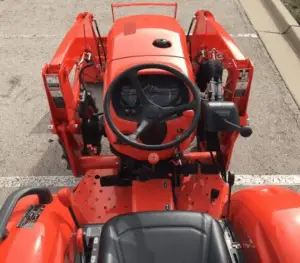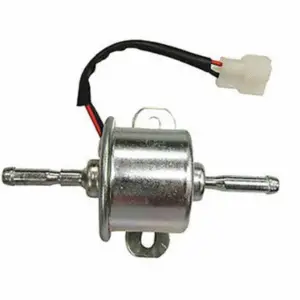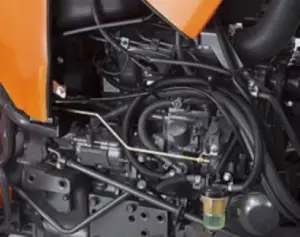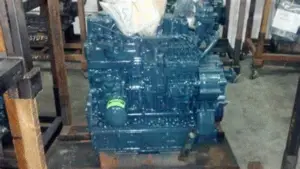Table of Contents

The Kubota L3301 is a compact tractor designed for small jobs around the home. It has a 3-point hitch at the rear and comes with a lift of between 1400 lbs and approx 2000 lbs, depending on your choice of attachments. The rear power takeoff transmission system means that it can be used to power other equipment, such as lawnmowers and seeders.
Kubota L3301 Common Problems
Kubota L3301 engines are known to have some common problems. Some of these are listed below:
Firing and starting problems: The starter motor might fail, or the engine may not start.
Overheating – This results from a failed thermostat or a leaky water pump gasket, which the owner himself can replace.
Fuel filter clogging – Oil may get sucked into the filter, causing clogging. Eventually, it will affect the engine’s operation because it can’t transfer fuel to the injectors.
Engine oil leaks: Engine oil leaks can be caused by worn-out seals or gaskets in engine components such as camshafts, cylinder heads, valve covers, etc., which need replacement by an expert mechanic only.
Fuel hose leaks: Fuel hose leaks can be caused by loose clamps or worn-out O-rings in fuel lines or fuel hoses, which need replacement by an expert mechanic only.
Coolant leaks: Coolant leaks can be caused by loose clamps or worn-out O-rings in cooling system components such as water pumps, thermostat housing, etc., which need replacement by an expert mechanic only.
Engine oil pressure light on – Engine oil pressure light on can be caused by worn out engine bearings or loose bolts on engine parts such as crankshaft pulley etc., which need replacement by an expert mechanic only.
Why Won’t Kubota L3301 Start?
If your Kubota L3301 doesn’t start, there are a few things you need to check before you can determine the problem. The first thing you should check if your Kubota L3301 won’t start is the battery. If it’s dead or dying, the engine won’t turn over. Ensure the battery terminals are clean and corrosion-free, then replace them if necessary. You may also have a loose connection at one or both ends of the battery cable. Check that there isn’t any corrosion on either terminal clamp, then tighten them up with pliers if necessary. If this doesn’t work, try a jumpstart with another tractor or truck with an identical battery size (12 volts). If this doesn’t work, you’ll need to take your Kubota L3301 to a mechanic for diagnosis and repair.
Kubota L3301 cooling system problems
Kubota L3301 Starts But Won’t Idle
Problem: My Kubota L3301 starts but won’t idle. It runs fine at high revs but dies as soon as I try to slow down.
Solution: The most common cause of this problem is a lousy carburetor float or faulty fuel pump primer bulb. You can test the carburetor by removing the air filter cover and priming the engine with your hand while watching the fuel line behind it. If it starts right up and idles well, then there’s nothing wrong with your carburetor, and it just needs to be cleaned out. If it still doesn’t run properly after cleaning, you will need to replace the carburetor with a new one from your local Kubota dealer or mechanic.
Kubota L3301 Runs Rough On Starting, Then Idles Normally After Warmed Up
The Kubota L3301 is a diesel-powered tractor with a 30-horsepower engine. The engine runs rough on starting, then idles normally after warming up. The symptoms may be caused by a faulty “crank angle sensor” and an “ignition coil.”
The crank angle sensor (CAS) is connected to the flywheel magneto drive shaft and provides input to the ECM for ignition timing. If it’s defective, the ECM will not fire at the proper time and will cause rough running when cold.
The ignition coil is located in the water jacket of each cylinder head, protected from water spray by a sealing gasket. Its function is to convert low voltage from the battery into high voltage required for the ignition spark at the spark plug gap. If it’s defective, it will cause rough running when cold.
If your Kubota L3301 has these problems, have your local mechanic inspect and replace them as necessary (usually both sensors at once).
Why Is My Kubota L3301 Transmission So Slow?
There are several reasons why your transmission may need to be faster.

Lack Of Fluid: One of the most common is a lack of fluid, which causes the fluid to heat up and expand. When this happens, the cooling system cannot keep up with the increased temperature. This can cause damage to other components in your Kubota L3301 transmission system.
Clutch Assembly: Another possible cause is a malfunctioning torque converter clutch assembly. This device helps manage the transmission and engine hydraulic pressure and control shifts between gears. If it fails, it can cause problems with shifting or even stall out completely.
Defective Valve: A third reason for slow shifting may be a defective valve body assembly or solenoid pack that regulates internal engine functions like speed, idle, and throttle position sensors for proper fuel calibration. A faulty valve body can also cause excessive noise inside your Kubota L3301 transmission, where gears and levers work together to shift gears smoothly.
Why Is My Kubota L3301 Fuel Pump Not Working?
The fuel pump on this model runs off of electricity, and if the electrical system on your tractor is not working properly, the fuel pump will fail to operate. If the fuel pump is not working, you will have trouble starting your tractor.

Fuel Pump: The first step in troubleshooting why your Kubota L3301’s fuel pump isn’t working is to check the electrical system on your tractor.
Check all fuses, and make sure that none are blown out or damaged in any way. If all fuses are good, check all the wires going into the fuse box and see if they are broken or frayed. If none of these help with getting your fuel pump working again, you may need to replace it altogether.
Check the engine oil level. If the oil level is too low, stop using the tractor until you add enough oil to bring it up to the proper levels. If you continue using the tractor with too little oil in the engine, you risk damaging internal components like pistons and bearings.
Electrical Connections: If there’s no problem with the oil level, check all electrical connections to ensure they’re tight. If there are loose connections or bad wires, replacing them will solve your problem.
Fuel Pump System: If there are no loose connections or damaged wires, then it’s time for a deeper inspection of your Kubota L3301’s fuel pump system. Start by looking at where fuel enters the engine:
Remove any fuel lines and inspect them for damage or leaks; replace any damaged parts; tighten all fittings that seem loose; reattach everything securely (without kinks).
Next, look at where fuel exits from your engine: Remove any hoses connected to your carburetor (if applicable) and inspect for leaks.
If you have a fuel filter, remove it and inspect the inside. If there is any debris in the filter, replace it. If not, reattach the filter and continue to test run the engine.
If you find no leaks in either area, check the fuel pressure.
Why Is My Kubota L3301 Won’t Start?
There are several reasons why your Kubota L3301 might not start, such as

Carburetor Problems
The carburetor is a device that mixes fuel and air so the engine can burn them together to produce power. If no fuel is in your tank or the carburetor does not work properly, your engine will not start. Before you troubleshoot other parts of your tractor, you must check these things first.
Fuel System Problems
If no fuel comes out from your carburetor when you start up your Kubota L3301, then there is something wrong with its fuel system. This problem could be as simple as a clogged fuel filter or as complicated as a faulty fuel pump.
Replace Old Spark Plug Carefully
If you have recently changed your engine oil and replaced the old spark plugs, then this might be why your Kubota L3301 won’t start. You may have forgotten to put the spark plug wire back into the distributor cap after replacing them, and now there is no spark coming out from the distributor cap.
Ignition Coil Failure
This problem can also be due to an ignition coil failure or a faulty starter motor. You must check these components individually to determine where the problem lies.
Why does the Kubota L3301 Tractor Won’t Start; it Just Clicks?
The problem is the starter. It will not engage the flywheel and turn the engine over. This can be caused by a worn starter clutch, faulty solenoid, or wiring problems. To start the engine, remove the starter and bench test it; if it does not work, replace it. If your tractor starts with a jump, then unplug the battery for 15 minutes and try again; this will reset all electrical components in the tractor and may solve your problem.
Why is Kubota L3301 Not Starting Diesel Engines In Cold Weather?
Diesel engines require less compression than gasoline engines because they operate at higher temperatures. However, when temperatures drop below freezing, they need more compression because they don’t generate enough heat during compression to ignite fuel without help from spark plugs or glow plugs.
The engine is equipped with a glow plug starter system to help get the engine started in cold weather. The glow plug system may not function properly when the temperature falls below freezing. You should always check to ensure your engine starts appropriately before leaving for work or heading out on a job site. If it does not start, there may be issues with the glow plug system, or something else could be causing the problem.
What Are The Kubota L3301 Engine Problems?

Some common Kubota L3301 engine problems can cause the Kubota L3301 to break down or fail to start. These problems include:
Kubota L3301 Engine Overheating
Sometimes engines overheat because of poor maintenance or running too hot for their normal operating temperature range. When you check it periodically, suppose you see overheating signs such as white smoke coming out of the exhaust pipe or bubbling up in your radiator fluid. In that case, you should take your vehicle to a mechanic as soon as possible before there’s any permanent damage done to your engine!
Kubota L3301 Low Oil Pressure
One of the most common issues with Kubota engines is low oil pressure. This can occur for many reasons, including worn-out parts or loose connections, but it can be easily fixed by replacing the parts causing the problem or tightening them up if they are loose. If you have a Kubota L3301 tractor, you should always check your oil levels regularly to detect any potential issues before they become serious!
Kubota L3301 Exhaust Leakages
The Kubota L3301 is a popular tractor for many reasons. One of these is that it comes with an effective catalytic converter, reducing emissions and making the engine run cleaner. However, the converter can be damaged by exhaust leaks which will cause it to fail. The only way to prevent this is by regularly checking your exhausts for leaks and repairing them as soon as possible. This will also help to avoid other engine problems, such as low oil pressure.
Kubota L3301 Oil Leaks
Oil leaks from the engine are common when there’s damage to gaskets or seals. This can cause problems with the oil pressure and damage other parts of the engine.
Air Filters
One problem that many owners experience is the failure of the air filter. This can cause your engine to run roughly or even stall. It’s important to change your air filter every time you change your oil so that you don’t end up with a dirty engine.
Kubota L3301 Intermittent Starting Problems
The Kubota L3301 is equipped with an electric starter, which means you can’t start the engine if it doesn’t work. The most common problem with this system is that it simply stops working after a while. When this happens, you’ll have to pull-start it every time you want to use it. This can be inconvenient but rarely dangerous because modern tractors have safety features designed to prevent injury when starting them by hand.
Kubota L3301 Carburetor Issues
The carburetor needs adjusting so that it meters fuel properly through each cylinder. This will allow for better combustion within each cylinder, which results in smoother running and more power from each cylinder when needed during the operation of your Kubota L3301 tractor model.
Kubota L3301 Transmission Problems
Many Kubota L3301 owners have reported transmission problems with their tractors, including slipping gears, leaking seals, and other issues that can lead to costly repairs if left unchecked over time. These transmissions typically last between 100-150 hours before needing servicing or replacement. Still, suppose you notice any unusual noises coming from your transmission area. In that case, you should take your tractor in for service immediately since it could indicate more severe problems than just a simple adjustment or adjustment would take care of.
Kubota L3301 Clutch Problems
Clutch problems are common among Kubota L3301 tractors, especially if used in extreme conditions or for heavy-duty tasks like plowing through snow drifts or pulling large trailers. The clutch on a Kubota L3301 can fail due to wear and tear after several years of use, but there are also other causes, such as damage from hitting an object with the front wheels while in gear if you notice any unusual vibrations coming from your machine when moving forward or backward, then you should have it checked out immediately by a qualified technician who can determine what type of repair is required to get your tractor back up and running again safely.
Does Kubota L3301 Have Break Down Issue?
Yes! This is one of the most common issues with Kubota L3301 tractors.
The Kubota L3301 has an air-cooled engine, meaning it has no radiator. The engine runs on an air-cooling system and uses two-stroke diesel fuel. This type of engine is less powerful compared to a four-stroke diesel engine. It also produces less torque and lower fuel efficiency than four-stroke engines.
The problem occurs when the engine stops working suddenly. It starts again on its own, but at other times, you may need to take it for repair at a local workshop or even at the dealer’s workshop itself. In case of any emergency like this, always consult an expert mechanic who can identify and fix the problem as soon as possible without causing further damage to your tractor.
What Are Kubota L3301 PTO, Hitch Problems?
The first problem that you will encounter with this mower is related to its PTO system. The PTO system may fail after some use because of poor maintenance or overloading of the transmission system. You may notice that your mower doesn’t move forward or backward after attaching it to your tractor or trailer using its hitch system. This means that something wrong with your PTO system needs to be repaired immediately before it causes further damage to other components of your machine, such as its engine or transmission system.
Common causes include:
- Worn belt
- Sticking clutch plate
Hitch Problems
The hitch on your Kubota L3301 connects your tractor to implements like plows and trailers. If it becomes loose or damaged, it can lead to alignment issues and poor performance. Common causes include:
- Damaged pins or bushings
- Loose bolts.
Kubota L3301 Trouble Codes
| Trouble Code | Problem Indication |
| P0000 | No Trouble Codes Detected |
| P0010 | TPS Voltage Out of Range |
| P0011 | TPS Voltage Too Low (circuit low) |
| P0012 | TPS Voltage Too High (circuit high) |
| P0013 | TPS Signal Circuit Intermittent/Erratic |
| P0016 | Throttle Position Sensor A Circuit Range/Performance |
| P0017 | Throttle Position Sensor A Circuit Low Input |
| P0018 | Throttle Position Sensor A Circuit High Input |
| P0019 | Throttle Position Sensor B Circuit Range/Performance |
| P0020 | Throttle Position Sensor B Circuit Low Input |
| P0021 | Throttle Position Sensor B Circuit High Input |
| P0022 | Crankshaft Position Sensor A Circuit Range/Performance (Bank 1) |
| P0023 | Crankshaft Position Sensor A Circuit Low Input (Bank 1) |
| P0024 | Crankshaft Position Sensor A Circuit High Input (Bank 1) |
| P0025 | Crankshaft Position Sensor B Circuit Range/Performance (Bank 2) |
| P0026 | Crankshaft Position Sensor B Circuit Low Input (Bank 2) |
| P0027 | Crankshaft Position Sensor B Circuit High Input (Bank 2) |
Final Verdict
The Kubota L3301 is one of the most popular models of small front-line tractor manufacturers all over. Although it is a good tractor, it has some mechanical problems. However, they all are practically solvable, and you can fix them on your own. The troubleshooting guide will help you avoid the problems and solve the ones that appear.
Related Posts
